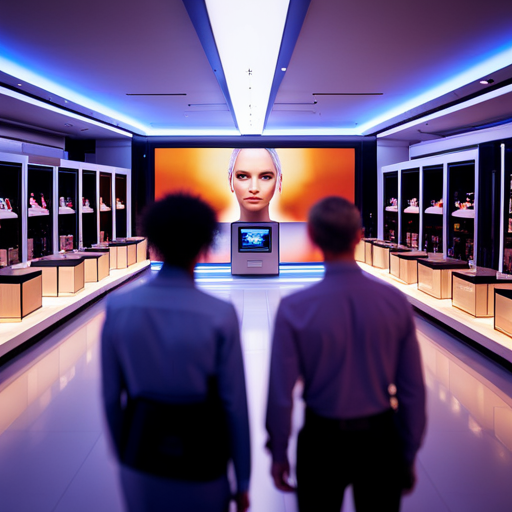Are you ready to witness the game-changing power of AI in the retail industry?
Get ready for a revolution as artificial intelligence takes center stage, transforming the way we shop and experience retail.
With AI, you can expect personalized recommendations, improved inventory management, and optimized supply chains.
The future of retail is here, and AI is leading the way.
Get ready to embrace a whole new level of convenience and efficiency in your shopping journey.
Key Takeaways
– AI is revolutionizing the retail industry by providing personalized recommendations and improved customer service through chatbots.
– AI-powered personalization in retail allows for a tailored shopping experience and real-time assistance from chatbots.
– AI enhances inventory management by automating demand forecasting, replenishment, and tracking across multiple locations.
– AI-driven supply chain optimization in retail leads to efficient inventory management, cost-effective shipping, and automation of warehouse operations.
The Impact of AI on Customer Experience in Retail
@ Midjourney AI Image Prompt: /imagine prompt:Create an image showing a smart AI-powered chatbot assisting a customer on a mobile device, while a personalized virtual shopping assistant suggests products based on the customer’s preferences, enhancing the retail experience. –v 5.2 –ar 16:9
You’ll be amazed at how AI is transforming your retail experience by personalizing recommendations and improving customer service.
Artificial Intelligence has revolutionized the way retail businesses interact with their customers, creating a more personalized and seamless shopping experience. With AI-powered recommendation engines, retailers can analyze vast amounts of customer data to understand individual preferences and make tailored product suggestions. Whether it’s suggesting complementary items based on past purchases or offering personalized discounts, AI enables retailers to deliver a more personalized and relevant shopping experience.
Additionally, AI has greatly improved customer service in the retail industry. Chatbots equipped with natural language processing capabilities can handle customer queries and provide real-time assistance, enhancing the overall shopping experience. These AI-powered chatbots are available 24/7, ensuring that customers receive immediate support and reducing the need for physical customer service representatives. AI can also analyze customer feedback and sentiment analysis to identify areas of improvement and address any issues promptly.
Moreover, AI has made significant advancements in inventory management, ensuring that retailers have the right products in stock at the right time. By analyzing historical sales data, AI algorithms can accurately predict demand patterns and optimize inventory levels, minimizing stockouts and overstocking.
AI-Powered Personalization in Retail
@ Midjourney AI Image Prompt: /imagine prompt:Create an image showcasing a futuristic retail store with intelligent AI algorithms analyzing customer preferences, displaying personalized product recommendations on digital screens, and seamlessly integrating virtual assistants for enhanced shopping experiences. –v 5.2 –ar 16:9
Using AI-powered personalization, retailers can tailor the shopping experience to your preferences. By analyzing your past purchase history, browsing behavior, and demographic information, AI algorithms can make personalized product recommendations that match your unique tastes and interests.
When you visit an online store, AI can instantly display items that are most likely to appeal to you, increasing the chances of finding something you love. AI can also personalize the layout and design of the website based on your preferences, making it easier for you to navigate and find what you’re looking for.
Additionally, AI-powered chatbots can provide real-time assistance, answering your questions and offering recommendations based on your preferences. In physical stores, AI can use facial recognition technology to identify you as a loyal customer and provide personalized greetings or offers.
With AI-powered personalization, retailers can create a more engaging and satisfying shopping experience, increasing customer loyalty and driving sales. So, the next time you shop, be prepared for a personalized experience that caters to your unique tastes and preferences.
Enhancing Inventory Management With AI in RetAIl
@ Midjourney AI Image Prompt: /imagine prompt:Create a visual representation of a high-tech retail store with a futuristic inventory management system powered by AI. Show shelves stocked with products, robots assisting customers, and an AI-powered device tracking inventory in real-time. –v 5.2 –ar 16:9
Enhancing inventory management with AI in retail can streamline operations, optimize stock levels, and minimize out-of-stock situations. By implementing AI technology, you can revolutionize your inventory management practices, leading to increased efficiency and profitability.
Here are some ways AI can enhance inventory management in retail:
– Demand forecasting: AI algorithms can analyze historical sales data, market trends, and even external factors like weather patterns to accurately predict future demand. This allows you to adjust your stock levels accordingly, reducing the risk of overstocking or running out of popular items.
– Automated replenishment: With AI, you can automate the replenishment process by setting up triggers that prompt restocking when inventory levels reach a certain threshold. This ensures that you always have the right amount of stock on hand, preventing lost sales due to out-of-stock situations.
– Real-time inventory tracking: AI-powered systems can provide real-time visibility into your inventory, allowing you to monitor stock levels across multiple locations. This enables you to optimize stock allocation, identify slow-moving items, and make informed decisions about inventory management.
– Efficient order fulfillment: AI can optimize order picking and packing processes by suggesting the most efficient routes for warehouse staff and automating repetitive tasks. This reduces labor costs and improves order accuracy and speed.
AI-Driven Supply Chain Optimization in Retail
@ Midjourney AI Image Prompt: /imagine prompt:Create an image displaying a futuristic retail warehouse with automated robots swiftly navigating aisles, precisely stocking shelves, and efficiently managing inventory, showcasing the seamless integration of AI in optimizing supply chain operations in the retail industry. –v 5.2 –ar 16:9
To optimize your supply chain in retail, leverage AI-driven technology for efficient inventory management and streamlined order fulfillment.
AI-powered systems can analyze vast amounts of data to make accurate demand forecasts, ensuring that you have the right amount of stock on hand at all times. By automatically tracking sales trends, customer preferences, and market conditions, AI can help you make informed decisions about inventory replenishment, reducing the risk of overstocking or running out of popular items.
This technology can also optimize your order fulfillment process by suggesting the most cost-effective shipping routes and carriers, minimizing delivery times and costs. Additionally, AI can improve warehouse operations by automating tasks such as inventory counting, picking, and packing, increasing efficiency and reducing errors.
With AI-driven supply chain optimization, you can save valuable time and resources, improve customer satisfaction, and gain a competitive edge in the retail industry.
The Future of AI in Retail: Trends and Predictions
@ Midjourney AI Image Prompt: /imagine prompt:Create an image depicting a futuristic retail store, with AI-powered robots seamlessly assisting customers, shelves stocked by automated systems, and personalized shopping experiences through digital screens and facial recognition technology. –v 5.2 –ar 16:9
With the continued advancements in AI technology, experts predict that the future of retail will see even more efficient inventory management and streamlined order fulfillment processes. Imagine a world where AI-powered robots roam the aisles, automatically restocking products based on real-time demand and analyzing customer preferences to optimize product placement. This level of automation will not only reduce manual labor costs but also ensure that shelves are always stocked with the right products, minimizing out-of-stock situations and maximizing sales opportunities.
AI will also revolutionize the way retailers interact with customers. Personalized shopping experiences will become the norm, with AI algorithms analyzing customer data to offer tailored recommendations and promotions. Virtual shopping assistants will guide customers through their shopping journey, answering queries and providing real-time assistance.
In addition, AI will play a crucial role in fraud detection and prevention. By continuously analyzing large volumes of transaction data, AI algorithms can identify patterns and anomalies that may indicate fraudulent activity, allowing retailers to take proactive measures to protect themselves and their customers.
Overall, the future of AI in retail looks promising. By leveraging the power of AI, retailers will be able to deliver enhanced customer experiences, optimize their operations, and stay ahead in the competitive market.
| Trends and Predictions | ||
|---|---|---|
| :——————-: | :——————–: | :——————-: |
| Personalized Shopping Experiences | Efficient Inventory Management | Fraud Detection and Prevention |
| AI algorithms analyze customer data to offer tailored recommendations and promotions. | AI-powered robots automatically restock products based on real-time demand. | AI continuously analyzes transaction data to identify patterns and anomalies for fraud detection. |
Frequently Asked Questions
How Does AI in RetAIl Impact Job Opportunities and Employment in the Industry?
AI in retail can impact job opportunities and employment by automating tasks, such as inventory management and customer service, which may reduce the need for certain roles. However, it can also create new jobs in areas like AI development and data analysis.
What Are the Potential Ethical Concerns and Risks Associated With AI Implementation in RetAIl?
The potential ethical concerns and risks associated with AI implementation in retail include privacy breaches, job displacement, and algorithmic biases. It’s important to address these issues to ensure a responsible and beneficial use of AI technology.
Can Ai-Powered Personalization in Retail Lead to Privacy Concerns for Customers?
AI-powered personalization in retail can lead to privacy concerns for you. The collection and use of your personal data to tailor shopping experiences may raise questions about data security and potential misuse.
How Does AI Affect the Pricing Strategies and Competitive Landscape in the RetAIl Industry?
AI affects pricing strategies and the competitive landscape in retail by analyzing data to determine optimal prices, identifying market trends, and enabling dynamic pricing. It helps retailers stay competitive and meet customer demands effectively.
What Are the Challenges and Limitations of Using AI in Inventory Management and Supply ChAIn Optimization in RetAIl?
When it comes to using AI in inventory management and supply chain optimization in retail, you’ll face challenges and limitations. AI can help streamline processes, but it may struggle with complex decision-making and human judgment.
Conclusion
So there you have it, the rise of AI is truly revolutionizing the retail industry.
With its impact on customer experience, personalized recommendations, efficient inventory management, and optimized supply chains, AI is transforming the way retailers operate.
And the best part is, this is just the beginning.
As technology continues to advance, we can expect even more innovative AI solutions to emerge, making the future of retail even more exciting.
So get ready, because AI is here to stay and it’s changing the game for the better.



